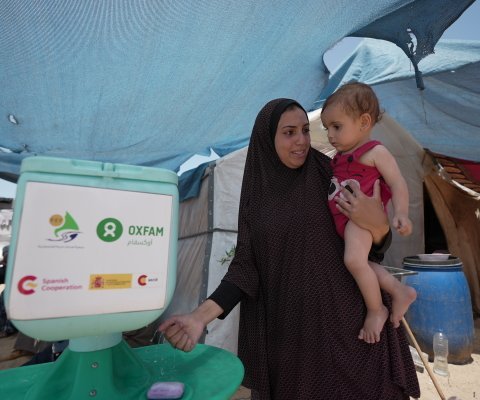The relief effort in Darfur is one of Oxfam's largest programs worldwide. How has the humanitarian situation changed there?
The achievements of Oxfam and other aid agencies in Darfur have been truly incredible. Jan Egeland, the former UN Humanitarian Coordinator, described the humanitarian response in Darfur as among the most successful in the world, and he was right. The high levels of mortality and malnutrition that we saw at the start of the crisis have been greatly reduced. Many people now have better access to water, sanitation, and education than they did before the conflict. However, other things have not improved. People in Darfur still live in daily fear of violence. Those living in camps cannot go outside without risking attack. The number of people in need of help keeps rising. There are now four million people in Darfur who rely on aid.
What are the biggest challenges Oxfam faces now in Darfur?
Safety and security is by far the biggest concern for both civilians and our staff. Our ability to reach people in need is decreasing due to hijackings and attacks on aid workers. Early in my time here I drove for hours through North Darfur, from El Fasher to our programs in Kebkabiya, through quite stunning scenery. Now this road is far too dangerous for us to use and we rely almost entirely on UN flights. In terms of security, we are operating at the very limit of what we can tolerate as an organization, and if the situation continues to deteriorate then we may be left with no option but to withdraw from Darfur. The humanitarian impact of this could be catastrophic. It's vital that the world leaders do more to ensure an end to the violence so that aid agencies can continue our life-saving work.
The crisis is now in its fifth year. Is there any sign that Darfur will move on from being a humanitarian emergency and into a development and recovery stage?
Oxfam has been working in Darfur for more than 20 years, carrying out development work with local communities. We all hope that we can resume this as soon as possible. But at the moment Darfur is still an enormous humanitarian crisis and we cannot resume large-scale development work until there is a sustainable political solution to the conflict. People continue to be attacked and displaced by the thousands. We are still seeing people arrive in the camps where we work. The situation in Darfur is incredibly complex and we have to be very careful. For example, many of the villages that people have fled from are now inhabited by other communities, and if we were to provide development assistance to them we would risk legitimizing this.
What has been your proudest achievement in your time here?
The relationship between non-governmental organizations and the Sudanese government has been complicated and at times difficult. Back in early 2004 we just could not get our staff members the necessary visas and permits to get to Darfur and respond to the urgent needs there. It was very frustrating. Our staffers have since done a wonderful job in building a working relationship with the authorities—both in Khartoum and at the field level—and as a result these problems have now been eased considerably. Without this success, we would not have been able to have such an impact on the ground and provide water and assistance to half a million people.
And your biggest frustration?
When I took up the post of country program manager, Darfur was one of the world's largest humanitarian crises. Today the security situation for people there is perhaps even worse, and the prospect of peace seems as far away as ever. It has been incredibly frustrating to see the hard work of our staff thwarted by insecurity in so many places. In Gereida in South Darfur, for example, the team did a magnificent job to set up water supply to 130,000 displaced people. But since then we have had to withdraw from the area because of insecurity. Across Sudan there are still many challenges. Marginalization and poverty are still endemic, and there are increasing threats to the nationwide Comprehensive Peace Agreement.
Finally, what personal memories will you take from working in Africa's largest country?
Outside Sudan, very little is known about the country, its people, and culture. What does get attention is mostly war and human suffering. Despite the enormous problems in the country, the Sudanese people are incredibly friendly and welcoming. I can honestly say that in my years of working around the world, my job in Sudan has probably been the most satisfying and enjoyable. The Sudanese are also extremely resilient people. It is incredible to go to the camps in Darfur or to the harsh deserts of the east and see how people cope in the face of adversity. It makes me feel confident for the future that Oxfam can work closely with local communities to help build a better Sudan.


